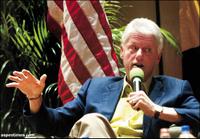Solar Power, Global Warming and Jobs
Uni-Solar announced June 15 that it will break ground this month on a new photovoltaic manufacturing plant near its existing plant in Auburn Hills, Michigan. The new plant will mirror the present PV factory effectively doubling the production capacity to 50 megawatts a year.
Tax incentives from the State of Michigan amounting to $6.1 million over 20 years and $100,000 Economic Development Training Grant sweetened the reasons for locating the second plant just miles from the Uni-Solar home factory. The new 160,000 square foot facility will house Uni-Solar's unique thin-film solar panel manufacturing equipment and provide 200 more jobs.
"Finding alternative sources of energy is critical in the new economy of the 21st century," said Governor Jennifer M. Granholm. "Michigan remains committed to staying at the forefront of alternative energy research, development and manufacturing, and companies such as United Solar Ovonic and ECD Ovonics [Uni-Solar's parent company] will help us achieve our goals."
Why doesn't the federal government provide more of such tax incentives to PV manufacturers? The answer has many "reasons" and here are a few:
First, President Bush says he supports alternative energy sources but offers huge incentives for continuing oil and gas exploration and "cleaner coal" technologies in the present energy bill. The plan gives $8 billion in new tax breaks to oil corporations and $2 billion in incentives to the coal industry. This after Exxon-Mobil generated $25 billion in profits last year--the most by any corporation in U.S. history.
Second, Bush stubbornly avoids or ignores the preponderance of data showing man-made causes for global warming--mostly from burning fossil fuels. He won't even mandate increased gas mileage on new American vehicles either, which would at least slow greenhouse pollution and decrease our dependence on Arab oil. But then, how would the likes of Exxon-Mobil continue making their gross--and I mean gross--profits?
Third, the Administration says taking part in the Kyoto Accords would hurt our economy. Hmmm, how would that happen?
Increasing gas mileage means Americans could travel farther on a gallon of gas while reducing CO2 emissions. Slower gas consumption would stabilize or even reduce gas prices allowing for more dollars to be spent elsewhere. How would that hurt the economy?
Significant energy could be conserved by doing fairly simple things. Mandating businesses to use fluorescent lighting over incandescent not only saves on lighting costs but can mitigate air-conditioning costs. The heat given off by standard light bulbs in factories can be very high. Upgrading insulation and using light-colored or reflective paints on flat factory roofs can provide further energy savings. Again, this savings can be utilized for other things. How can this be bad for the economy?
The Bush Administration says jobs would be lost. Well, more jobs have been lost under his leadership than any president since WW II and there has been little effort to replace them. Furthermore, oil drilling, refining, coal mining and modern power plants are so automated today that they employ far less personnel than most people think. By supporting solar or wind technologies, job growth could be phenomenal. In fact, since Germany got serious about solar ten years ago 350,000 jobs were created alone in that emerging industry. Germany today has about 84.5 million people and the U.S. has 296 million. Do the math.
I liked the way Bush's predecessor summed up the whole issue at the recent Aspen Ideas Festival in Colorado (Aspen Times, July 12, 2005):

"We've got to make it a national security argument and we've got to make it a jobs argument and we've got to make the price of oil irrelevant," Bill Clinton said, suggesting the country could create millions of jobs if alternative energy efforts received a fraction of the tax incentives that go to "old energy."
"This is a lay-down economically and it's nuts that we're not doing it," said the former president, earning a round of applause not just in Harris Hall, but in nearby Paepcke Auditorium, where an overflow audience and members of the press watched a simulcast of the interview.




1 Comments:
I really like the information provided in this article and I really like the way you have explained each and everything so well. Very well done with the article, hope that you will continue to do posting
Buy A Solar Panel For Home
Solar Panels Las Vegas NV
Best Home Solar Panels
Post a Comment
<< Home